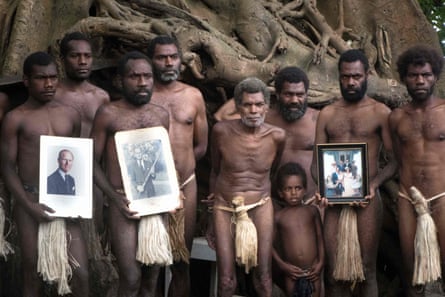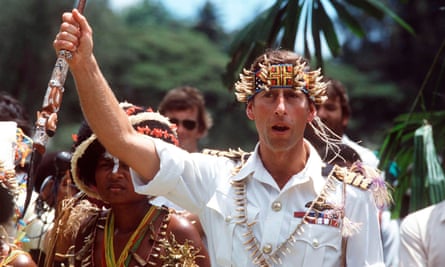The coronation of King Charles III will take place thousands of kilometres from the Pacific, but in some pockets of the region the significance of the ceremony that will unfold in Westminster Abbey on Saturday runs deep.
The small island nation of Vanuatu is home to a group of villagers in Tanna who hold particularly close ties with the royal family.
They believe Prince Philip was born on Tanna and left before the second world war to seek his fortune. He travelled to the UK where he met, wooed and wed the most powerful woman in the world. Folklore says that his spirit lives on in Tanna.
When Prince Philip died in 2021, Chief Lalu, from west Tanna told the Guardian that Prince Charles was also considered one of their own. “Prince Philip’s family is Tanna’s family,” he said.

News that Charles is to be crowned king has been met with happiness in Tanna. On Saturday, the islanders are expecting the British high commissioner Nicolette Brent to join in their celebrations, sip kava in a special yellow coconut shell and watch ceremonial dances. Pigs will be slaughtered in honour of the new king.
“There will be flag raising, there will be exchanges of kastom [traditional] bags and speeches,” says Jean Pascal Wahe, who works at the local cultural centre.
“There is a lot of excitement, the people seem to be happy preparing for it.”
The ABC reported that more than 5,000 people are expected to mark the coronation on Tanna.
While the Tanna is a special case, several Pacific nations are sending leaders to London for the coronation.
Fiji, a Crown colony from 1874 to 1970, shares one of the region’s oldest relationships with the monarchy. Its president Ratu Wiliame Katonivere and his wife, Filomena Dikumete-Katonivere, have already departed for the British capital.
Fiji’s military is also taking part in the day, with personnel marching in the coronation parade through central London along with 7,000 other Commonwealth participants.
For 25-year-old Fijian Mereani Kuinikoro, the coronation represents a chance to see history in the making.
“I think that’s an interesting time to live in. Personally I’ve never seen a coronation live so it will definitely will be great to witness that.
“All our lives we’ve only ever seen a Queen reign … I think it will be good to see how Charles does as King. Although I don’t really have any interest in the day to day activities of the royal family, I think it’s still intriguing to see history in the making.
“And shoutout to the English taxpayers for making it happen because it sounds expensive.”
While the crowning of the new king will pass quietly in some Pacific island countries, Papua New Guinea has a special bond with Charles. Part of Papua New Guinea, known as British New Guinea, was under British rule for 90 years and in 1975, Prince Charles announced Papua New Guinea’s independence on behalf of the Queen. It remains a constitutional monarchy with king Charles the head of state.

Foreign affairs minister Justin Tkatchenko says there will be celebrations on Saturday in the capital Port Moresby to mark the coronation.
“Prince Charles has a great historical value here in Papua New Guinea, when he announced Papua New Guinea independent, so this Saturday all the public and community are welcomed to the Sir Hubert Murray Stadium to celebrate the coronation of King Charles the III there will be fireworks once the King is crowned,” he says.
While some countries including Vanuatu have left the Commonwealth to become republics, Papua New Guinea has sought to strengthen ties with the Commonwealth, with recent visit by secretary general of the Commonwealth Patricia Scotland.
“We want to see more interaction with the Commonwealth, it’s a big number of countries that are part of the Commonwealth, they have a big voice, we can all work together as one for security, trade, economic enhancement, health and education,” Tkatchenko says.
Among members of the public in PNG, there was a sense of excitement ahead of Saturday.
“For me, I grew up seeing big posters of Queen Elizabeth II and have had an interest in the British monarchy,” says Hannah Pongi Kurua from the East Sepik province.
“It’s also heartwarming to see that the very young prince who announced [Papua New Guinea’s] independence in 1975 will now be crowned King 48 years later. God save the King.”

 1 year ago
82
1 year ago
82










 English (US)
English (US)